
Douglas, Wyoming
Douglas was established in 1886 with the arrival of the railroad. The area,
however, was settled beginning in 1867
with the establishment of Ft. Fetterman,
11 miles north of present day Douglas.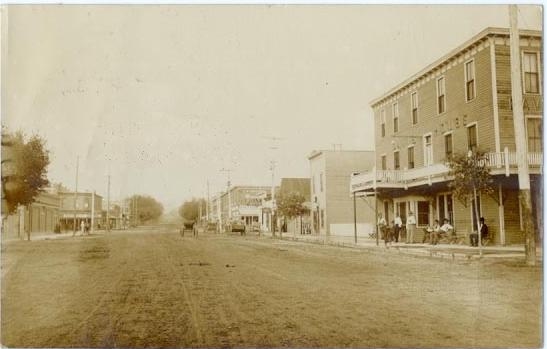
Cedar Street, 1909, Davis House Hotel to left
Lower left, looking North from Oak and 4th, 1911
The fort and the adjacent community
of Fetterman City were
named after Capt. Wm. J. Fetterman, who was killed near Ft. Phil Kearney.
The Fort was always regarded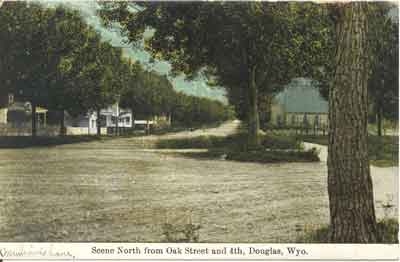 due to lack of amenities and supplies as hardship
duty. Until the arrival of the railroad, supplies had to be brought overland
from either Medicine Bow Station on the Union Pacific or from Ft. Laramie.
The fort was abandoned in 1882. C. H. King, grandfather of Gerald Ford, had a
merchantile establishment in Fetterman City, but moved to Douglas upon the
arrival of the Railroad and Fetterman City was abandoned. King later moved to
Shoshoni where he also operated a merchantile business. The site of his store
in Shoshoni is now occupied by the Yellowstone Drug Store, famous for its real
milkshakes. due to lack of amenities and supplies as hardship
duty. Until the arrival of the railroad, supplies had to be brought overland
from either Medicine Bow Station on the Union Pacific or from Ft. Laramie.
The fort was abandoned in 1882. C. H. King, grandfather of Gerald Ford, had a
merchantile establishment in Fetterman City, but moved to Douglas upon the
arrival of the Railroad and Fetterman City was abandoned. King later moved to
Shoshoni where he also operated a merchantile business. The site of his store
in Shoshoni is now occupied by the Yellowstone Drug Store, famous for its real
milkshakes. Fetterman City was also the site of the Fetterman Hospital Association,
an early form of a health maintenance organization. Cowboys, working for some of
the large ranches, could belong by having a small sum deducted from their pay,
and be guaranteed health care for anything except certain social ailments.
In 1886, the Chicago, and Northwestern reached Douglas, photo below, built across
the river from the site of Ft. Fetterman. In the Douglas Park Cemetary lie the
remains of James M. "Doc Middleton" Riley (1851-1913), who begain his career as a horse-thief
and murderer at age 14 and George Pike (1863?-1906), purported rustler:
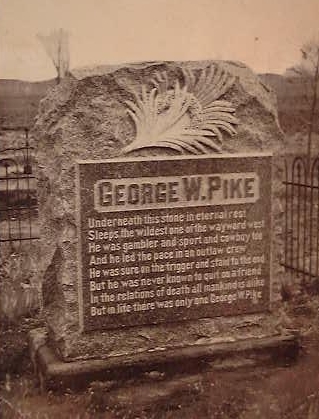 Pike Grave Stone, Douglas Park Cemetery Pike Grave Stone, Douglas Park Cemetery
Underneath this stone in eternal rest
Sleeps the wildest one of the wayward west
He was a gambler and sport and cowboy too
And he led the pace in an outlaw crew
He was sure on the trigger and staid to the end
But he was never known to quit on a friend
In the relations of death all men are alike
But in life there was only one George W. Pike
Pike, like many a cowboy, appeared in Wyoming having participated in a cattle drive north from Texas. Later he was
employed by Lee Moore. Moore, a Douglas ranchman, was suspected by the larger ranchers of having
enhanced his herds through improper means and was allegedly on the
"death list" of Johnson County war fame. Moore fought on the side of the small
ranchers at the siege of the TA. But, bygones will be bygones. Moore's son LeRoy Moore married the daughter of
W. C. Irvine, one of the leaders of the Invaders.
Today debate rages over whether Pike led the pace in an outlaw crew, the manner of his death, and
the author of the epitaph. Although, Pike was charged with rustling and with other crimes, Pike always
seemed to be found not guilty. His reputation as a rustler allegedly resulted in a confrontation in a
saloon with Robert Carey of the CY in which Carey threated Pike with death if he was ever found on
the CY. Pike in his criminal trials was generally defended by well-known Douglas lawyer Frederick Harvey. Harvey allegedly
helped spirit from the Douglas Jail the two trappers who had bunked with Nate Champion and Nick Ray at the
KC. The two were being held as material witnesses to the murder of
Champion and Ray. Harvey's siding with the invaders did not, of course, preclude him from
defending rustlers. Harvey later sucessfully defended Will Reid who allegedly stole some of Pike's own cattle. Harvey also
represented Lewis Smith who was accused of stealing a Fiddleback steer. It is likely that the steer was
actually stolen without Smith's knowlege by cowboys on the Merrill ranch.
As to Pike's death, in one version Pike died of
a heart attack after winning a large hand in a poker game in a local saloon. Newly elected sheriff
Charles Messenger was allegedly a participant in the game.
Since it is impolite to quit when ahead, the remaining players decided that if
George could speak for himself he would have stayed to the end, he would
not quit on a friend and the game should continue. George was propped up and a bystander was requested
to continuing playing George's hands. George's winning streak continued and
allegedly he won enough to go off in grand style and pay for the tombstone pictured above right. In some
sense, one can perhaps see a rather punny allusion in the epitaph to how George played out life's last hand.
It should, however, be noted that it was reported by Bill Barlow's Budget that Pike died under more
prosaic circumstances in the hospital of a liver ailment of long standing. Of course, it may be speculated if the
story of the poker game were true, the participants would not
want it known as to the circumstances of Pike death. It would have
been a bit embarrassing for the sheriff to be participating in a poker game with a reputed
rustler, one whose surities had to make good on a forfeited bond on a felony charge the very day before Pike's death. If Pike was
indeed dying of the liver ailment, it might have provided an excuse for his
non-appearance in the District Court and avoided the necessity of bond forfeiture.
Initially, Pike was buried north of town, but was moved to the Douglas Park cemetery in 1908 when the
monument was brought up from Denver. Although, there are different versions of who composed the
epitaph, a popularly accepted version is that it was written by a bartender in Lee Pringle's
College Inn Bar discussed on the next page.
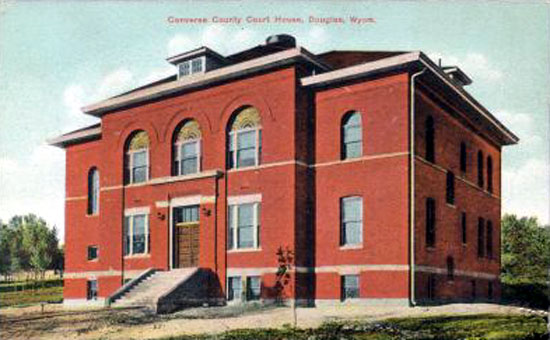
Converse County Courthouse,
Douglas, Wyoming. Photo by H. R. Daniels
Of course, Douglas was not the only place in the wild west that a corpse was propped up to assist with a
gambling game. In New Mexico Territory, there was Bernalillio County Judge Willam C. Heacock who loved to
play three card monte in the backroom of a local saloon. When Judge Heacock would run short of money, he
would send several deputies to go out and find a drunk and bring the drunk to the courtroom above
the saloon. The drunk could then be fined. The Judge's widow later recalled
one occasion in the 1890's when the judge ran short:
Before long the deputies returned, carrying a limp man between them.
"What the Hell?" said the Judge. "What's that you got?"
"Your Honor," replied one of the deputies, as be straightened up from placing his burden
on the floor, "we found him in the back room of The Blue Indigo."
"Can he stand trial or is he dead drunk?" asked the Judge.
"He's not drunk, but he's dead all right. He croaked himself over there in the
Blue Indigo. The proprietor insisted that we get him out of there."
The Judge was annoyed. "Didn't the fools ever hear of an inquest?" he asked.
He had sent for a lucrative drunk, not a drooling suicide.
He turned solemnly to his deputies. "This court is a court of justice," he said.
"The right of habeas corpus must not be ignored. The prisoner must be given a speedy
and fair trial. This court is ready to hear evidence. What is the charge?"
"Your Honor," spoke one of the deputies. "The charge has not yet been determined."
"This court will hear no case without a charge. Did you search the prisoner?"
"There was a letter to some dame---" began the deputy.
"Any money?"
The deputy counted $27.32.
"Any weapons?"
They took a gun from the hip pocket.
"Has the prisoner anything to say before sentence is imposed upon him?"
Judge Heacock cooked his ear expectantly toward the prone prisoner. "In view of the
unresponsiveness of the prisoner which this court interpret as contempt, and in view
of the unlawful possession of a lethal weapon this court imposes a fine of $20.00 and
court costs," pronounced the Judge.
"You might as well leave him there till morning," said the Judge as he pocketed
the money. The monte game continued on the floor below. Interview by Janet Smith with Mrs. William C.
Heacock, American Life Histories: Manuscripts from the Federal Writers' Project, 1936-1940.
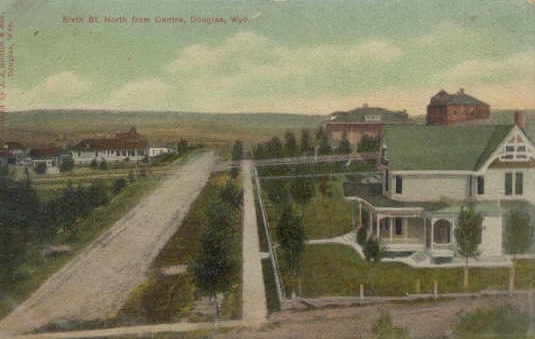
Douglas, 6th Street, looking north from Center
Next page: Douglas continued, Doc. Middleton and the Great Endurance Race.
|